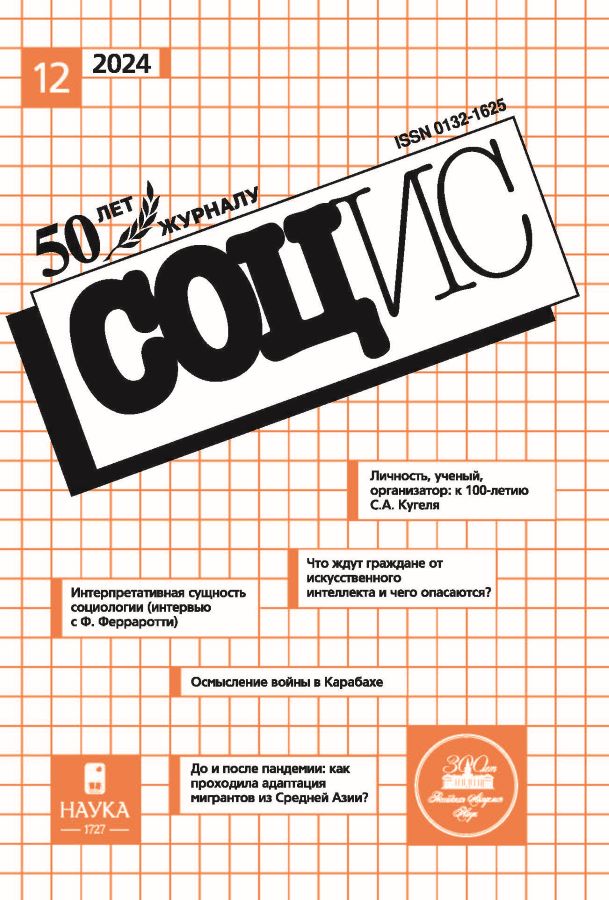Russian discourses on technological sovereignty (evidence from expert survey)
- Authors: Kapoguzov E.A.1, Pakhalov A.M.1, Sheresheva M.Y.1
-
Affiliations:
- Lomonosov MSU
- Issue: No 12 (2024)
- Pages: 24-37
- Section: SOCIAL REALITIES: THE CHALLENGES OF THE TIMES
- URL: https://ruspoj.com/0132-1625/article/view/683566
- DOI: https://doi.org/10.31857/S0132162524120037
- ID: 683566
Cite item
Abstract
The article discusses approaches to the sociological understanding of the concept of “technological sovereignty”, which is one of Russia’s political priorities against the background of sanctions pressure and the evolution of the modern world system towards increasing polycentrism. A systematic review of European and Russian research papers and official documents demonstrates a sharp increase in interest in the topic of technological sovereignty over the past decade, despite significant differences in the definition of this term. The empirical part of the study is based on the content analysis of interviews conducted by the authors (N = 25) with leading Russian academic experts and practitioners. Based on the analysis of interviews, key narratives (elements of perception) of the essence and mechanisms of ensuring technological sovereignty are identified. It was found that among domestic experts, the predominant attitude is to increase national control over key technologies while maintaining international economic ties. When discussing Russia’s technological independence, experts go beyond the securitization discourse that dominates official documents to a discourse of increasing competitive advantages and efficiency. The experts surveyed believe that China’s experience of achieving technological sovereignty is generally more successful than Russia’s, but the experts remain sceptical about the possibility of implementing China’s experience in Russia.
Full Text
About the authors
Evgeny A. Kapoguzov
Lomonosov MSU
Author for correspondence.
Email: egenk@mail.ru
Dr. Sci. (Econ.), Associate Prof., Head of Laboratory for BRICS-Related Studies
Russian Federation, MoscowAlexander M. Pakhalov
Lomonosov MSU
Email: pakhalov@gmail.com
Research Fellow, Laboratory for Institutional Analysis, Faculty of Economics
Russian Federation, MoscowMarina Yu. Sheresheva
Lomonosov MSU
Email: m.sheresheva@mail.ru
Dr. Sci. (Econ.), Prof., Head of Laboratory for Institutional Analysis, Faculty of Economics
Russian Federation, MoscowReferences
- Afontsev S. A. (2024) Theoretical Dimensions of Economic Sovereignty. Zhurnal Novoy ekonomicheskoy assotsiatsii [Journal of the New Economic Association]. No. 3: 218–224. (In Russ.)
- Agarwal M., Kumar S. (2023) BRICS Countries’ Increasing Role in the World Economy, Including Institutional Innovation. BRICS Journal of Economics. No. 4 (2): 173–191.
- Bezrukov A., Baydarov D., Faikov D. (2024) State Technological Leadership: Conceptual Understanding and Formation Mechanisms. Ekonomicheskoe vozrozhdenie Rossii [The Economic Revival of Russia]. No. 1: 75–89. (In Russ.)
- Danilin I. V., Sidorov E. A. (2024) The Concept of Technological Sovereignty in the Transforming World. Zhurnal Novoy ekonomicheskoy Assotsiatsii [Journal of the New Economic Association]. No. 3: 238– 243. (In Russ.)
- Dementiev V. E. (2023) Technological Sovereignty and Priorities of Localization of Production. Terra Economicus. No. 1: 6–18. (In Russ.)
- Dezhina I. G. (2023) Theoretical Grounds and Practical Steps to Ensure Technological Sovereignty in Russia. Problemy deyatelnosti uchenogo i nauchnykh kollektivov [The problems of scientist and scientific groups activity]. No. 9: 92–102. (In Russ.)
- Dezhina I. G., Kliucharev G. A. (2020) Russian Concepts of International Scientific-technological Cooperation: Changing Drivers of Development. Sociologiya nauki i tekhnologij [Sociology of Science & Technology]. Vol 11. No. 4: 51–68. (In Russ.)
- Early B. R., Cilizoglu M. (2020) Economic Sanctions in Flux: Enduring Challenges, New Policies, and Defining the Future Research Agenda. International Studies Perspectives. Vol. 21. No. 4: 438–477.
- Edler J., Blind K. et al. (2023) Technology Sovereignty as an Emerging Frame for Innovation Policy. Defining Rationales, Ends and Means. Research Policy. No. 52(6): 104765.
- Gareev T. R. (2023) Technological Sovereignty: From Conceptual Contradiction to Practical Implementation. Terra Economicus. No. 4: 38–54. (In Russ.)
- Kapoguzov E. A., Pakhalov A. M. (2024) Technological Sovereignty: Conceptual Approaches and Perceptions by the Russian Academic Experts. Zhurnal Novoy ekonomicheskoy assotsiatsii [Journal of the New Economic Association]. No. 3: 244–250. (In Russ.)
- Kirdina-Chandler S.G. (2022) Unipolarity, Multipolarity and Bipolar Coalitions. XXI Century. Sotsiologicheskie issledovaniya [Sociological Studies]. No. 10: 3–16. (In Russ.)
- Latov Yu.V., Latova N. V. (2018) Russian Technological Innovation in the Domestic Media (The Case of Technology Parks). Mir Rossii. Sociologiya. Etnologiya [Universe of Russia. Sociology. Ethnology]. No. 4: 141–162. (In Russ.)
- Lenchuk E. B. (2024) Technological Sovereignty – a New Trend in Russian Scientific and Technological Policy. Zhurnal Novoy ekonomicheskoy assotsiatsii [Journal of the New Economic Association]. No. 3: 232– 237. (In Russ.)
- Panibratov A. (2021) Sanctions, Cooperation, and Innovation: Insights into Russian Economy and Implications for Russian Firms. BRICS Journal of Economics. No. 2: 4–26.
- Saaida M. (2024) BRICS Plus: De-dollarization and Global Power Shifts in New Economic Landscape. BRICS Journal of Economics. No. 1: 13–33.
- Shirokova E. Yu. (2024) Scientific and Technological Development of the Regions: Trends and Activation Determinants. Vestnik Moskovskogo universiteta. Ser. 6: Ekonomika [Moscow University Economics Bulletin]. No. 3: 171–190. (In Russ.)
- Solovyev E. G. (2024) Evolution of the Concept of “Sovereignty” – is there a Place for Economic Sovereignty in Political Science. Zhurnal Novoy ekonomicheskoy assotsiatsii [Journal of the New Economic Association]. No. 3: 225–231. (In Russ.)
- Volchik V. V. (2021) Discourses on Social Barriers to Developing Russian (Contra) Innovation System: Reality or Narrative? Sotsiologicheskie issledovaniya [Sociological Studies]. No. 10: 61–71. (In Russ.)
- Yurevich M. A. (2023) Technological Sovereignty of Russia: Concept, Measurement, and Possibility of Achievement. Voprosy teoreticheskoy ekonomiki [Theoretical Economy Issues]. No. 4: 7–21. (In Russ.)
Supplementary files











